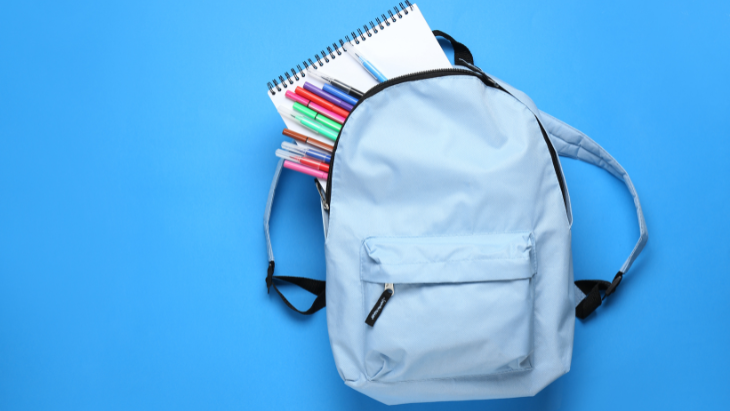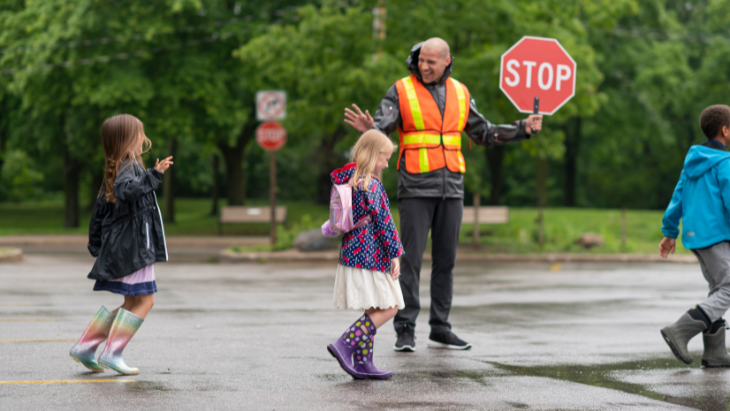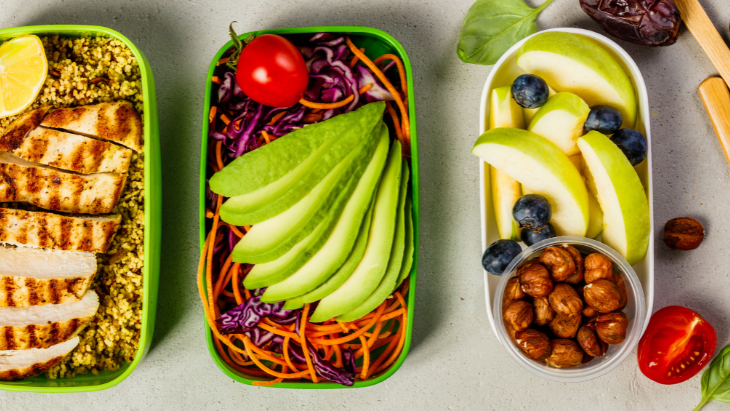
The days of blissful holiday freedom are drifting away, and it's time to shift gears into back-to-school mode. But don't sweat it, at ellaslist, we've got you covered with the top back-to-school tips for Australian parents.
From re-establishing bedtime routines to packing super nutritious lunchboxes, and even making homework seem less like work, we're here to help you tackle the new school year head-on. Ready to become a master of the school term transition?
Top Back-to-School Tips for Australian Parents
1. Label Everything

Wave goodbye to the heartache of lost school gear! If you don't want your child’s belongings to embark on an unplanned adventure, label them.
Every pencil, book, backpack, and even those tiny lunch containers that seem to have legs of their own should have your child's name on them. It's not just about keeping track; it's about saving your sanity and wallet when these items decide to take a detour. Think of labels as GPS trackers for school supplies. They might not beep, but they sure do speak volumes in the lost-and-found box.
2. Practice the Routine
Before the school year kicks off, it's rehearsal time.
A few days prior, mimic the morning routine – waking up early, getting dressed, having breakfast, and maybe even a mock journey to school. It's less about glamour and more about practicality, like a Broadway show, but with toothbrushes instead of microphones. This sets the tone for your kids and gives you a chance to iron out any kinks in your plan. And remember, a smooth morning often leads to a smoother day.
3. Bedtime Rules
Sleep is not just for the weary but also for the young scholars. Re-establishing a consistent bedtime routine is essential for those early school mornings. Well-rested kids are like well-oiled machines; they function better, think clearer, and, yes, are significantly less cranky.
This goes for parents, too! A bedtime ritual might include winding down activities, a set lights-out time, and a bedtime story for the younger ones. It's a time to disconnect from the day's hustle and bustle and transition into a peaceful slumber.
RELATED:
The Best Kids' Lunch Boxes for 2026
4. Backpacks

Ensure your child's daily comfort by choosing a lightweight, durable backpack with wide, padded straps.
A correctly fitted backpack that supports the back can make a significant difference in reducing daily strain and discomfort. An ergonomic backpack is not only good for your child's posture but also can make carrying school supplies easier. Plus, picking their own design will make them feel 'cool' for school.
5. Reinforce Safety Rules

Reinforcing essential safety rules is crucial to preparing your child for the school year, especially if they travel to and from school independently.
It's about instilling a sense of awareness and responsibility beyond the classroom. Discussing and regularly refreshing these guidelines helps ensure your child remains safe and develops good habits for life.
Start by reviewing the basics, like looking both ways before crossing the street. Emphasise the importance of staying vigilant and avoiding distractions like mobile phones or overly loud music when crossing roads. You could practice this together by taking walks and demonstrating safe crossing at different types of intersections.
Sticking to familiar routes when walking or biking to school is another key safety rule. Map out the safest path with your child and walk or ride it with them a few times before school starts. This not only familiarises them with the route but also helps you identify any potentially unsafe areas. Remind them to always take these predetermined routes and avoid shortcuts through less-travelled or poorly-lit areas.
Understanding the concept of "stranger danger" is also vital. Discuss with your child what they should do if approached by a stranger. This includes:
- Not accepting rides or gifts from someone they don't know.
- Keeping a safe distance.
- Knowing when and how to seek help.
Please encourage them to trust their instincts and to report any encounters that make them feel uncomfortable immediately.
In addition to these, it's essential to discuss what to do in case of emergencies. Make sure they know their full name, address, contact number, and how to dial emergency services. They should also know a safe place to go if they need help, like a trusted neighbour's house, a school, or a public library.
6. Balance Screen Time

In today's tech-centric world, it's increasingly important to establish and maintain clear screen time rules, especially as a new school term begins. As children are increasingly exposed to screens for educational and recreational purposes, setting boundaries is key to maintaining a healthy balance.
Start by defining what constitutes purposeful screen time. Distinguish between screen time for homework or educational apps and for leisure, such as gaming or social media. Make it clear that the former is a priority, while the latter is a privilege that comes with responsibilities.
Create a daily routine that allocates specific times for various activities.
This routine should include time for study, rest, play, and limited recreational screen time. For example, you might decide that screen time is allowed only after homework is completed and for a set duration. This helps children understand that screen time is part of their day, not the focus.
Remember, the goal of establishing screen time rules is not to restrict your child, but to promote a balanced, healthy lifestyle. It's about making them understand the value of time and how to use it effectively in a world where screens are omnipresent. By setting these boundaries and providing diverse experiences, you're helping your child develop a well-rounded perspective on technology's role in their life.
7. Address First-week Nerves

It's normal for children to feel apprehensive about the new school term.
Encourage open dialogue about their worries. Share your own first-day experiences and how you overcame your nerves. Discuss positive aspects of school and highlight exciting opportunities that the new term brings.
8. Kick-off With a Celebration
Mark the start of the academic year with a small celebration.
This could be a special breakfast, a favourite family outing, or a back-to-school tradition. Celebrations instil a sense of excitement and positive anticipation about the new school year.
9. Construct a Homework Zone

Establishing a dedicated homework station is more than just organising a space; it's creating a mindset for academic success. This area should be a designated zone where focus and learning take centre stage. Whether it's a quiet corner of their bedroom, a section of the living room, or even a part of the dining table, this space signals to your child that their schoolwork is a priority.
In setting up this area, involve your child in the process. Let them choose some supplies or decorations to personalise their space. This gives them a sense of ownership and pride in their homework station. Make sure the area is well-lit and equipped with all necessary materials: pens, paper, calculators, or a computer, if needed. Think of it as a mini-office for your mini-CEO.
The homework station should be a distraction-free zone. You might even consider having a "homework time" for the whole family, where everyone engages in quiet activities or reading. This not only supports your child but also promotes a family culture of valuing learning and education.
10. Attend Open Houses
If your child's school organises orientation days or open houses, try to attend as many as possible. This provides an opportunity to meet teachers, familiarise yourself and your child with the school layout, and ask any lingering questions.
This familiarity helps to ease first-day nerves and creates a sense of belonging.
11. Review School Materials Together

A top back-to-school tip for older students is to review class schedules and school maps and understand what each subject entails, which can help reduce first-day anxiety.
If possible, practise the route between classes and discuss time management strategies for handling class schedules.
12. Get Tech-Savvy
As many schools are increasingly using digital platforms for assignments, grades, and communication, it's important that both you and your child know how to navigate these systems.
This can help prevent technical glitches once school starts, allowing your child to focus on learning.
13. Discuss Social Challenges
Equip your child with strategies to handle potential social challenges such as bullying and peer pressure. In the diverse social landscape of a school, children may encounter various situations such as bullying, peer pressure, and conflicts. It's essential to provide them with tools and guidance on navigating these complexities with confidence and integrity.
Start by having open discussions about bullying. Explain bullying, including its different forms – physical, verbal, and online. Emphasise that it's not just the act of hurting someone; it's any behaviour that makes someone feel isolated, threatened, or belittled. Teach them to recognise bullying, not only when it happens to them but also when it happens to others, and discuss the importance of not being a bystander. Encourage them to stand up for themselves and others safely and always report bullying incidents to a teacher or trusted adult.
Peer pressure can be another significant challenge. Talk to your child about the importance of staying true to their values and beliefs, even when others might try to influence them otherwise. Role-play scenarios where they might face peer pressure, such as being offered to cheat on a test or experimenting with risky behaviours. Discuss ways they can assertively but respectfully decline and the value of choosing friends who respect their choices.
It's also crucial to teach them about seeking help from a trusted adult in difficult situations. Children should know that asking for help isn't a sign of weakness. Identify specific adults in their lives, such as family members, teachers, or school counsellors, whom they can approach when they feel overwhelmed, scared, or confused.
14. Boost Extracurricular Activities

Encouraging your child to participate in extracurricular activities is more than just keeping them busy after school; it's about fostering their personal growth and expanding their horizons. When selecting these activities, it’s important to focus on your child's interests and passions. Whether it's sports, music, art, drama, or a technology club, engaging in activities they genuinely enjoy can significantly enhance their overall school experience.
These activities offer numerous benefits. They provide a platform for children to develop new skills that might not be covered in the regular school curriculum. For instance, being part of a sports team can teach valuable lessons in teamwork, persistence, and sportsmanship, while participating in a drama club can enhance public speaking skills and boost self-confidence.
Moreover, extracurricular activities are an excellent way for children to make new friends outside their usual classroom environment. This can be particularly beneficial for developing social skills and building a diverse group of friends who share similar interests. It's a way of finding their tribe, where they feel a sense of belonging and acceptance.
15. Prep Nutritious Lunches

Planning and preparing a week's worth of healthy lunches and snacks is a game-changer for busy parents during the school year. This strategy is not just about ensuring your child has a variety of nutritious options to keep them energised and focused throughout the day; it's also about simplifying your life and reducing daily stress.
To start, consider creating a weekly lunch menu that rotates. This can include a balance of proteins, carbohydrates, fruits, and vegetables. Think of sandwiches with different fillings, wraps, pasta salads, or homemade sushi rolls. Including a small treat or a personal note can add a bit of joy to their lunchbox. Variety is key to keeping your child interested in their meals and ensuring they get a range of nutrients.
Snack preparation is equally important. Instead of resorting to pre-packaged snacks, try preparing batches of healthy options like veggie sticks with hummus, fruit slices, yogurt, or homemade granola bars. These can be portioned out for each day, making it easy to grab and go in the mornings.
Involve your child in the preparation process. This can be a fun weekend activity and a great opportunity to teach them about nutrition and cooking. Let them choose some of the items for their lunches or help with simple tasks like washing fruits or assembling sandwiches. This not only makes them more likely to eat what is packed but also fosters a sense of independence and responsibility.
16. Plan Weekend Family Time
Schedule regular family activities for the weekends. This could be as simple as a family game night, a picnic in the park, or exploring a new part of the city. It's important to balance the school week with family bonding time, giving everyone something to look forward to.
More Parenting Tips
Easy Self-Care Ideas For Busy Mums
Magnesium for Kids: The Ultimate Guide for Boosting Kids' Health
What are Probiotics for Kids?
Have you signed up for our newsletter? Join ellaslist to get the best family and kid-friendly events, venues, classes and things to do NEAR YOU!
Reviews



 Pick a Date
Pick a Date


